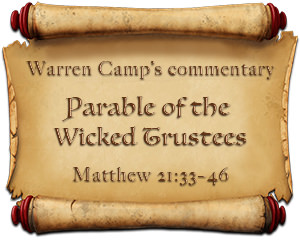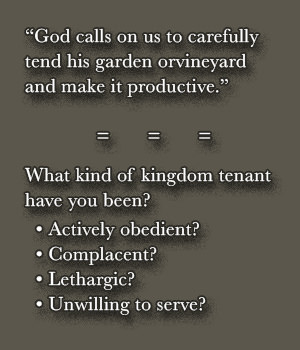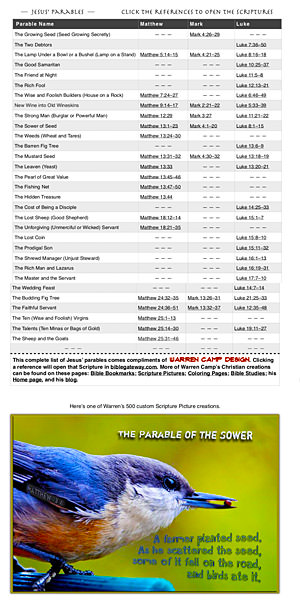
This parable is quite easy to understand. It’s clear in its implications. What makes it stand out is the harsh message it conveys and how its intended audience received the news.
In essence, the Jewish leaders who heard Jesus tell this story agreed with its main point and recognized that it referenced them. Insulted and hurt by that, they ended up acting out that parable. In other words, they heard the warning but ignored it, instead charging ahead ruthlessly, which wouldn’t end well for anyone.
Incidentally, Jesus spoke about the heaven-or-hell judgment more than anyone else in the Bible and in a very specific way. More than half of the parables that Jesus told relate to God’s eternal judgment of sinners.

† Find Warren’s short summary at the bottom of page.

Click the list or the “bird” to enlarge and use Warren’s list of forty-four of Jesus’ parables (a PDF file with links to Scriptures).
Start Reading Warren’s Commentary . . .
Find his summary at the bottom.
par•a•ble [noun] a simple story used to illustrate the meaning of or a moral or spiritual lesson, as told by Jesus in the gospels
synonyms: allegory, moral story/tale, fable
Jesus’ Parable of the Wicked Trustees / Tenants
Matthew 21:33–46; Mark 12:1–12; Luke 20:9–19
In telling the religious leaders the Wicked Tenants Parable, Jesus offered them another challenging parable that focuses on “judgment.” [You can find all seven of Jesus’ judgment-specific parables on our “Parables” home page.] He set the scene by describing the investment that a landowner had made in his vineyard. Jesus detailed the extent of time and energy needing to be expended in planting, fencing, digging, and building it. He went on to mention that the landowner would place the responsibility of wise stewardship of his vineyard on the trustees or tenants who’d work on his behalf.
The main point of the Parable of the Wicked Tenants is this: Judgment awaits those who fail to produce the fruit that’s owed the Master.
Let’s look at who’s represented in this challenging parable, what the responsibilities of the trustees/tenants were, and what the dire consequence was of their not fulfilling them.
This video interprets Jesus’ Parable of the Wicked Tenants.
The Parable of the Wicked Tenants
A Parable of Judgment
Matthew 21:33–46 (also in Mark 12:1–12 and Luke 20:9–19)
We must first put into context the telling of this parable and the Parable of Two Sons. Look at Matthew 21:18, wherein Jesus curses a fig tree early in the morning, before going to the temple courts to teach (21:23). While he was teaching, the chief priest and elders confronted him, wanting to know by what authority he was teaching. Not allowing them to control the conversation, Jesus answered their question by first asking them a question (vv. 24–26). They didn’t like his question or his response to their answer; essentially, he’d told them that they couldn’t save face from their obvious attempt to persuade him and, therefore, he wasn’t obligated to answer their question (v. 27). Jesus told them that John the Baptist and he had received their authority from the same source. This exchange caused the leaders to become angry and oppose Jesus who further frustrated the priests by telling them two parables: the Parable of the Two Sons and today’s Parable of the Wicked Tenants.
In the Two Sons Parable, Jesus told the priests that they’d claimed to accept the message from God but they’d failed to live up to it by being obedient. For his listeners, the second parable (the Parable of the Wicked Tenants) was like pouring salt on a wound. Just in case they didn’t fully understand the first one (which they did), Jesus gave a much clearer picture of what he meant. Obviously, this second parable further infuriated the priests. But it also gave the others who were listening an opportunity to hear Jesus fully explain the implications of the disobedience of the Jewish people throughout the ages.
“Listen to another parable: There was a landowner who planted a vineyard. He put a wall around it, dug a winepress in it and built a watchtower. Then he rented the vineyard to some farmers and moved to another place. 34When the harvest time approached, he sent his servants to the tenants to collect his fruit (vv. 33–34).
As shown in all three gospel accounts of this landlord-tenant parable, the landowner reasonably expected the tenants to fulfill their part of the deal — to work the vineyard and pay the rent. But the tenants had other ideas: They saw the vineyard as theirs — anyone belonging to the landowner, who might approach them, would be considered a threat that was to be dealt with accordingly.
In v. 33 (shown above), the “landowner” represents God while the “vineyard” represents the Hebrew nationality. The “winepress” consisted of two tub-shaped cavities dug into rock at different levels; the upper being connected to the lower by an orifice cut through its bottom. Grapes were placed in the upper cavity, or trough, and were trodden by foot. The squeezed juice ran down through the orifice to the trough below, from which it was taken and stored in leather bottles until it fermented and became wine. A “watchtower” was a place where watchmen would be stationed to protect the vineyard from thieves, as grapes ripened for the vintage. The “farmers” represent the Jewish rulers who rented the vineyard, which was usual in those days.
When Jesus made mention of the landowner who “moved to another place,” he frequently referred to this withdrawal of the visible presence of God from the world, always bringing out the point that the withdrawal tested people’s faithfulness. And with his “he sent his servants to the tenants to collect his fruit,” he expected the children of Israel to bring forth joy, love, peace, and all the other goodly fruit of a godly life. He looked to those in authority to bring forth such results, and he’d sent prophets to the Israelites to encourage them to bear spiritual fruit.
“The tenants seized his servants; they beat one, killed another, and stoned a third. 36Then he sent other servants to them, more than the first time, and the tenants treated them the same way. 37Last of all, he sent his son to them. ‘They will respect my son,’ he said” (vv. 35–37).
Reading further, Jesus tells us that the tenants even resorted to killing the landowner’s own son.
“But when the tenants saw the son, they said to each other, ‘This is the heir. Come, let’s kill him and take his inheritance.’ 39So they took him and threw him out of the vineyard and killed him.” (vv. 38–39).
Lord Jesus brought this parable to the Israelites’ immediate present, revealing that his enemies had just spoken privately in each other’s ears. Jesus must have startled them. He probably demonstrated to them that their reasons for wanting to kill him documented his heirship. They regarded the Jewish nation as their property. As such, they were plotting to kill Jesus so that they might withhold it from him. That man might have intended to utilize such high-handed lawlessness to obtain title to a vineyard. However, that ought to seem incredible to us. After all, we’ve always been familiar with the even-balanced justice of constitutional government. But the public spirit among the people there and then, amid the corrupt bribe-receiving habits of their judges, should make our Lord’s parable picture very clear to us today. At this point in his parable, Jesus turned from history to prophecy.
Jesus then posed a question for his listeners: “When the owner of the vineyard comes, what will he do to those tenants?” (v. 40). Now that we know the story’s details, how should the landowner have responded to the tenants’ actions? . . . The answer is straightforward: The landowner was to deal severely with the tenants, thereafter handing the vineyard over to others who’d serve the landowner appropriately. At this stage, the parable’s listeners — the Jewish leaders — haven’t yet realized what Jesus meant.
“He will bring those wretches to a wretched end,” they replied, “and he will rent the vineyard to other tenants, who will give him his share of the crop at harvest time” (v. 41).
Verse 42’s quotation is from Psalm 118:22–23, which Jesus applied here as a prophecy to the Pharisees who, in their treatment of him, were like unskilled builders who rejected the very cornerstone of the building they sought to erect. The Pharisees were eager in their desire to set up a Messianic kingdom, but they were so blindly foolish that they didn’t realize that their kingdom couldn’t be set up unless it was built upon and around Christ Jesus, its cornerstone. They blundered in constructing their theory of the coming kingdom, failing to design their kingdom that would be founded and built upon Jesus.
This parable conveys a harsh message with a critical outcome. The tenants who rented the vineyard refused to pay what they rightfully owed the landowner. They not only didn’t pay the rent, they attacked and killed the landlord’s representatives who were sent to collect the rent; they even killed the landowner’s son! That’s a dramatic turning point: the sending of the beloved son. The conflict throughout this parable is driven forward by the tenants’ continual rejection and abuse of multiple waves of the owner’s servants. The climax is reached when the landlord decides to send his beloved son. All three gospel writers deliberately associate the parable’s “son,” who stands at the turning point of the parable, with the “stone” — the Son figure, Jesus himself.
After the murder of the “son,” all three accounts follow a similar narrative structure that builds up to and flows from the Psalm 118:22’s “stone” quotation (v. 42). The brilliance of this parable lies in how it puts into perspective what God expects from his people. The three accounts pivot on the Psalm 118 quotation. Jesus prompted a response from his audience; they became angry regarding the parable’s implications; it was only after the quote and Jesus’ interpretation of it, however, that the Pharisees and other religious leaders realized that “he had spoken this parable against them” (Luke 20:19).
The “stone,” of course, represents Jesus. In effect, without the Psalm 118 “stone” quote, the encounter ended with an abstract speculation by the audience; but upon hearing that quote and appreciating Jesus’ use of the “stone” metaphor, they realized that Jesus was directly condemning them (v. 45).
They looked for a way to arrest him, but they were afraid of the crowd because the people held that he was a prophet (v. 46).
Despite Jesus’ warning that they were killing the Son and would reap the consequences, and despite the fact that he showed that the Psalm, which the people had used so recently with regard to him, foretold a great rejection that would prove to be a mistake, the rulers yet persisted in their evil intention to take his life. The leaders’ only restraint was their fear of the people, many of whom were Galileans, men of rugged courage, ready to draw swords on Jesus’ behalf. Since they could neither arrest nor answer him, they withdrew collectively.
So, Who’s Who?
Did you recognize who Jesus has portrayed within his Wicked Tenants Parable? There are six main characters in it: (1) God himself was the landowner; (2) the vineyard symbolized the nation of Israel; (3) the landowner’s son who was killed was the Son of God; (4) the wicked trustees/tenants were played by the Jewish religious leadership, those officials of Israel who rejected those whom God had sent; (5) the landowner’s servants were the prophets who remained obedient and preached God’s Word to the people of Israel; and (6) the other tenants were the non-Jewish Gentiles.
The imagery used herein is similar to Isaiah’s parable of the vineyard (Isaiah 5:1–7): The watchtower and the wall that Jesus mentions in v. 33 of Matthew’s gospel symbolize the means of protecting the vineyard and the ripened grapes; the winepress is needed for stamping out the juice of the grapes to make the wine; the farmer was apparently away at the time of harvest and had rented the vineyard to the tenants. It was customary then for a vineyard owner to expect to receive as much as half the grape harvest as the tenants’ payment to use his land.
We read in this passage that the tenants (Pharisees) became furious when Jesus directed his harsh words toward them, calling them the poorest of tenants. The consequence for being wicked tenants is shown in v. 43.
For us, today, we are the renters of God’s land. Being the landowner, God expects us to work the land, tend his garden, and, as renters needing to pay rent, we’re to provide him with a reasonable return on his investment. How we renters respond to his provisions and tend his garden will determine how we’ll be seen by him on our day of judgment.
The Jewish religious establishment had, by rejecting Jesus as Messiah, also rejected God. As vineyard owner, God had the right to judge (v. 41) those who rented his land, refused to pay back the dues they owed, and killed people who the landowner sent to collect his rent.
In Jesus’ telling of this parable, the landlord expected his trustees to “produce fruit” as a representation of an appropriate proportion of the rent that’s owed. If the requisite amount of fruit wasn’t produced and returned to the landowner, two outcomes awaited the tenants: judgment and eviction, leading to replacement (vv. 41–44).
As Jesus closes one of his most important and divisive parables, he appears to have done something he hasn’t done elsewhere: quoted an Old testament passage to conclude a parable. He recited in v. 42 the text of Psalm 118:22: “‘The stone the builders rejected has become the cornerstone; the Lord has done this, and it is marvelous in our eyes’” Jesus continued the cornerstone metaphor in v. 44 to show how a stone could be used to (a) build something beautiful, such as his church, or (b) crush and destroy, depending on the situation.
A Hearty Way to Apply This Parable Today
Matthew was writing for the community of Jewish Christians who were coming to terms with the fact that the kingdom of God was passing from Jewish hands into the hands of non-Jewish Gentiles. He was also warning those newly entrusted with the kingdom that they don’t own the kingdom but, instead, are stewards of it; they were required to be faithful to that stewardship responsibility. They were obligated to produce kingdom fruit. Failing to do so, they might cause the kingdom to be taken from them.
God calls on us to tend to his vineyard and make it productive. When he gave it to us, the vineyard, gardens, and fields were lush, beautiful, and quite fertile. We must responsibly “work the kingdom fields” on his behalf. Otherwise, we’re bound to face the consequences that will surely come on Judgment Day.
Question 1 What kind of kingdom tenant have you been? Actively obedient? Complacent? Lethargic? Unwilling to serve?
Question 2 Can you be more responsible and God-honoring by becoming a better steward who’ll obediently serve him, in order to increase his crop? Sure you can. Start now: Seek, surrender, and serve.
Question 3 At different times in your life, how have you received Jesus? How do you receive him now?
Question 4 Is Jesus more like a millstone (being heavy) or a capstone (able to hold everything together) in your life? Why?
“Therefore I tell you that the kingdom of God will be taken away from you and given to a people who will produce its fruit” (Matt. 21:43).

Take our “Parables Quiz.”
See Warren’s other “Parables of Jesus” commentaries.
— Warren’s Concise Summary —
Jesus’ Parable of the Wicked Trustees tells of a landowner who plants a vineyard, equips it, and leases it to tenant farmers before traveling away. At harvest time he sends servants to collect his share of the fruit, but the tenants beat, stone, and kill them, and do the same to further servants sent afterward. Finally he sends his beloved son, whom the tenants kill in hopes of seizing the inheritance, so the owner comes, destroys those tenants, and gives the vineyard to others, picturing Israel’s leaders rejecting God’s prophets and ultimately his Son, and warning that those who refuse to yield the fruit that God seeks will face judgment and see their privileges given to a more faithful people.

